Exhibit 99.1
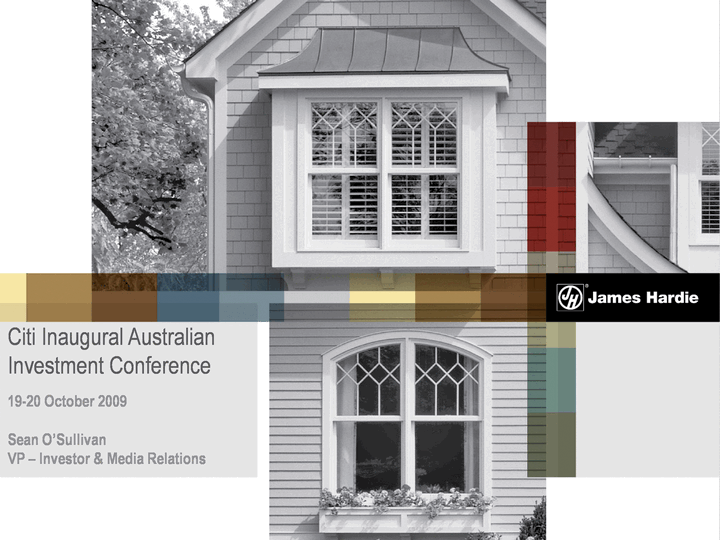
| Citi Inaugural Australian Investment Conference19-20 October 2009Sean O'SullivanVP - Investor & Media Relations |

| Citi Inaugural Australian Investment Conference19-20 October 2009Sean O'SullivanVP - Investor & Media Relations |
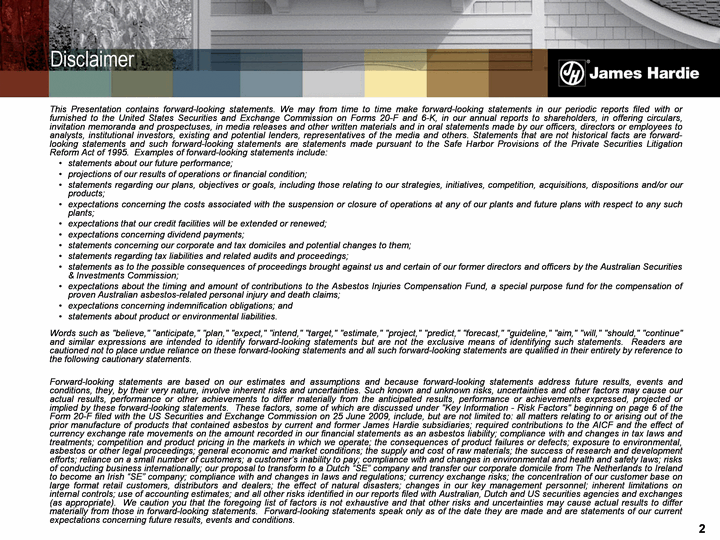
| 2 Disclaimer This Presentation contains forward-looking statements. We may from time to time make forward-looking statements in our periodic reports filed with or furnished to the United States Securities and Exchange Commission on Forms 20-F and 6-K, in our annual reports to shareholders, in offering circulars, invitation memoranda and prospectuses, in media releases and other written materials and in oral statements made by our officers, directors or employees to analysts, institutional investors, existing and potential lenders, representatives of the media and others. Statements that are not historical facts are forward- looking statements and such forward-looking statements are statements made pursuant to the Safe Harbor Provisions of the Private Securities Litigation Reform Act of 1995. Examples of forward-looking statements include: statements about our future performance; projections of our results of operations or financial condition;statements regarding our plans, objectives or goals, including those relating to our strategies, initiatives, competition, acquisitions, dispositions and/or our products;expectations concerning the costs associated with the suspension or closure of operations at any of our plants and future plans with respect to any such plants;expectations that our credit facilities will be extended or renewed;expectations concerning dividend payments;statements concerning our corporate and tax domiciles and potential changes to them;statements regarding tax liabilities and related audits and proceedings;statements as to the possible consequences of proceedings brought against us and certain of our former directors and officers by the Australian Securities & Investments Commission;expectations about the timing and amount of contributions to the Asbestos Injuries Compensation Fund, a special purpose fund for the compensation of proven Australian asbestos-related personal injury and death claims; expectations concerning indemnification obligations; andstatements about product or environmental liabilities.Words such as "believe," "anticipate," "plan," "expect," "intend," "target," "estimate," "project," "predict," "forecast," "guideline," "aim," "will," "should," "continue" and similar expressions are intended to identify forward-looking statements but are not the exclusive means of identifying such statements. Readers are cautioned not to place undue reliance on these forward-looking statements and all such forward-looking statements are qualified in their entirety by reference to the following cautionary statements.Forward-looking statements are based on our estimates and assumptions and because forward-looking statements address future results, events and conditions, they, by their very nature, involve inherent risks and uncertainties. Such known and unknown risks, uncertainties and other factors may cause our actual results, performance or other achievements to differ materially from the anticipated results, performance or achievements expressed, projected or implied by these forward-looking statements. These factors, some of which are discussed under "Key Information - Risk Factors" beginning on page 6 of the Form 20-F filed with the US Securities and Exchange Commission on 25 June 2009, include, but are not limited to: all matters relating to or arising out of the prior manufacture of products that contained asbestos by current and former James Hardie subsidiaries; required contributions to the AICF and the effect of currency exchange rate movements on the amount recorded in our financial statements as an asbestos liability; compliance with and changes in tax laws and treatments; competition and product pricing in the markets in which we operate; the consequences of product failures or defects; exposure to environmental, asbestos or other legal proceedings; general economic and market conditions; the supply and cost of raw materials; the success of research and development efforts; reliance on a small number of customers; a customer's inability to pay; compliance with and changes in environmental and health and safety laws; risks of conducting business internationally; our proposal to transform to a Dutch "SE" company and transfer our corporate domicile from The Netherlands to Ireland to become an Irish "SE" company; compliance with and changes in laws and regulations; currency exchange risks; the concentration of our customer base on large format retail customers, distributors and dealers; the effect of natural disasters; changes in our key management personnel; inherent limitations on internal controls; use of accounting estimates; and all other risks identified in our reports filed with Australian, Dutch and US securities agencies and exchanges (as appropriate). We caution you that the foregoing list of factors is not exhaustive and that other risks and uncertainties may cause actual results to differ materially from those in forward-looking statements. Forward-looking statements speak only as of the date they are made and are statements of our current expectations concerning future results, events and conditions. |
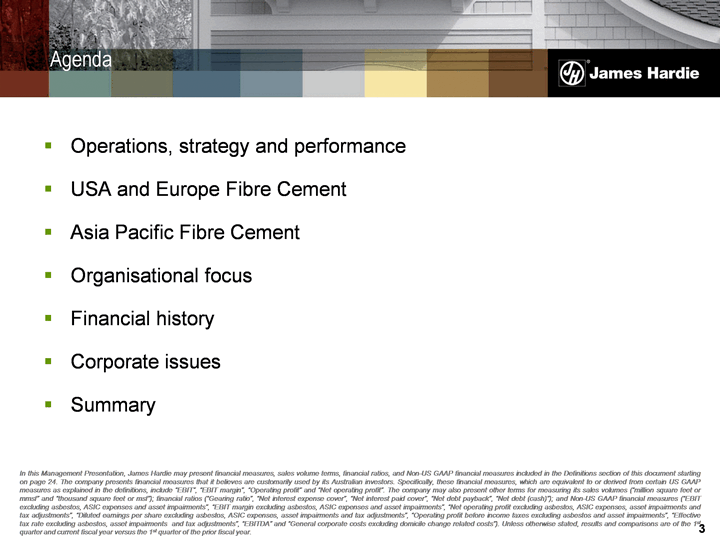
| 3 Operations, strategy and performanceUSA and Europe Fibre CementAsia Pacific Fibre CementOrganisational focus Financial history Corporate issues Summary Agenda In this Management Presentation, James Hardie may present financial measures, sales volume terms, financial ratios, and Non-US GAAP financial measures included in the Definitions section of this document starting on page 24. The company presents financial measures that it believes are customarily used by its Australian investors. Specifically, these financial measures, which are equivalent to or derived from certain US GAAP measures as explained in the definitions, include "EBIT", "EBIT margin", "Operating profit" and "Net operating profit". The company may also present other terms for measuring its sales volumes ("million square feet or mmsf" and "thousand square feet or msf"); financial ratios ("Gearing ratio", "Net interest expense cover", "Net interest paid cover", "Net debt payback", "Net debt (cash)"); and Non-US GAAP financial measures ("EBIT excluding asbestos, ASIC expenses and asset impairments", "EBIT margin excluding asbestos, ASIC expenses and asset impairments", "Net operating profit excluding asbestos, ASIC expenses, asset impairments and tax adjustments", "Diluted earnings per share excluding asbestos, ASIC expenses, asset impairments and tax adjustments", "Operating profit before income taxes excluding asbestos and asset impairments", "Effective tax rate excluding asbestos, asset impairments and tax adjustments", "EBITDA" and "General corporate costs excluding domicile change related costs"). Unless otherwise stated, results and comparisons are of the 1st quarter and current fiscal year versus the 1st quarter of the prior fiscal year. |
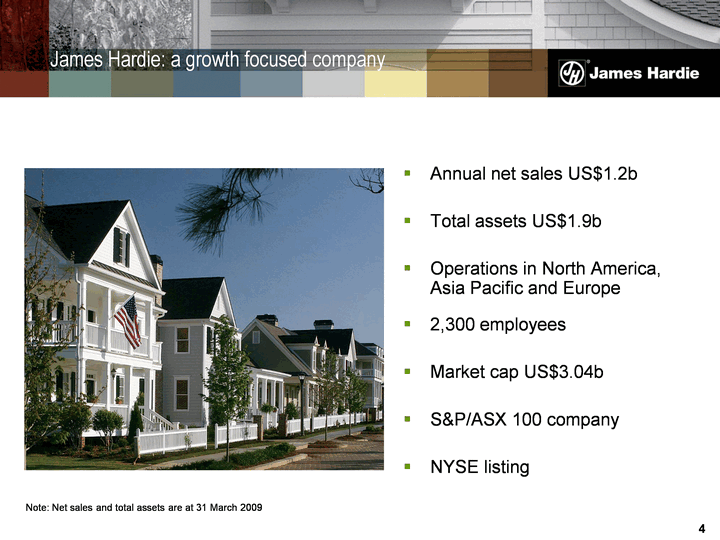
| 4 Annual net sales US$1.2bTotal assets US$1.9bOperations in North America, Asia Pacific and Europe2,300 employeesMarket cap US$3.04bS&P/ASX 100 companyNYSE listing Note: Net sales and total assets are at 31 March 2009 James Hardie: a growth focused company |
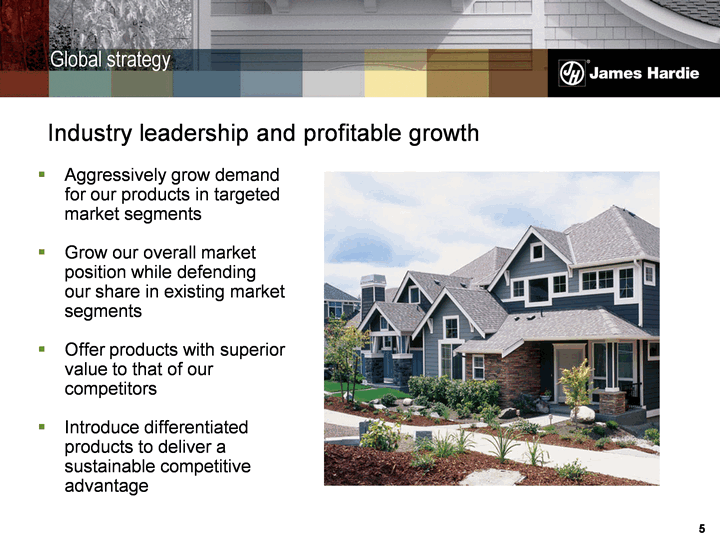
| 5 Aggressively grow demand for our products in targeted market segmentsGrow our overall market position while defending our share in existing market segments Offer products with superior value to that of our competitorsIntroduce differentiated products to deliver a sustainable competitive advantage Industry leadership and profitable growth Global strategy |
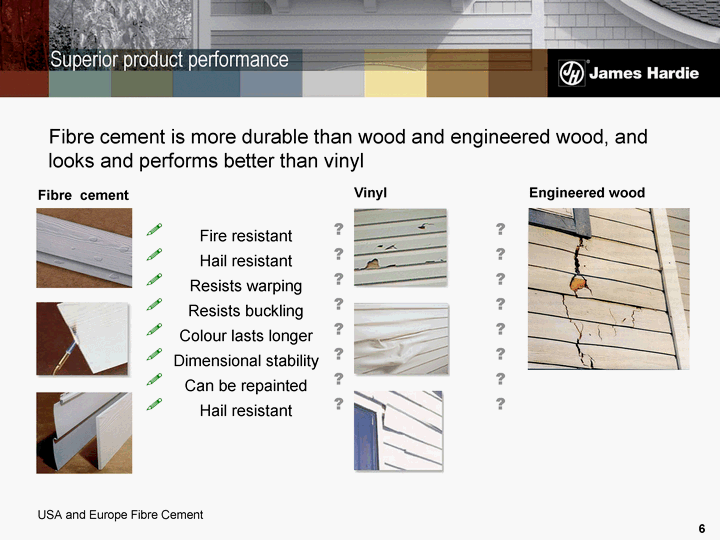
| 6 Fibre cement is more durable than wood and engineered wood, and looks and performs better than vinyl Vinyl Fire resistantHail resistantResists warpingResists bucklingColour lasts longerDimensional stabilityCan be repaintedHail resistant ???????? ???????? Fibre cement USA and Europe Fibre Cement Engineered wood ???????? Superior product performance |
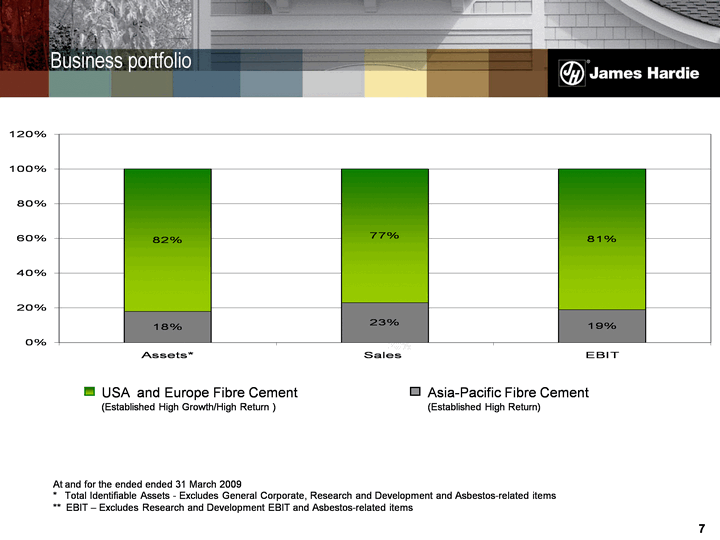
| 7 Business portfolio At and for the ended ended 31 March 2009* Total Identifiable Assets - Excludes General Corporate, Research and Development and Asbestos-related items** EBIT - Excludes Research and Development EBIT and Asbestos-related items USA and Europe Fibre Cement (Established High Growth/High Return ) Asia-Pacific Fibre Cement(Established High Return) 80% 82% 20% |
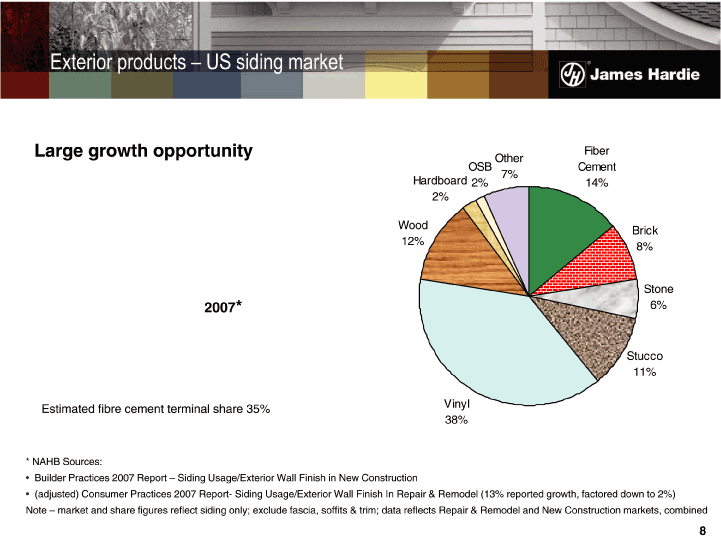
| 8 Exterior products - US siding market Large growth opportunity 2007* * NAHB Sources: Builder Practices 2007 Report - Siding Usage/Exterior Wall Finish in New Construction (adjusted) Consumer Practices 2007 Report- Siding Usage/Exterior Wall Finish In Repair & Remodel (13% reported growth, factored down to 2%)Note - market and share figures reflect siding only; exclude fascia, soffits & trim; data reflects Repair & Remodel and New Construction markets, combined Estimated fibre cement terminal share 35% |
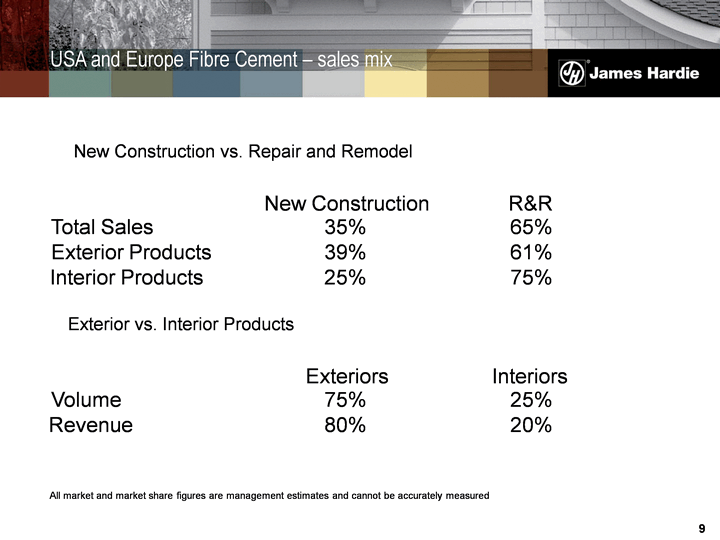
| 9 USA and Europe Fibre Cement - sales mix New Construction vs. Repair and Remodel New Construction R&R Total Sales 35% 65% Exterior Products 39% 61% Interior Products 25% 75% Exterior vs. Interior Products Exteriors Interiors Volume 75% 25% Revenue 80% 20% All market and market share figures are management estimates and cannot be accurately measured |
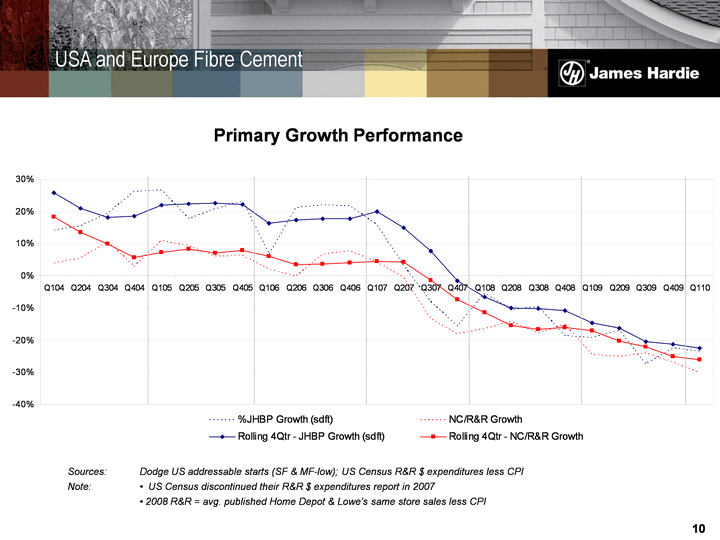
| 10 10 USA and Europe Fibre Cement Primary Growth Performance Sources: Dodge US addressable starts (SF & MF-low); US Census R&R $ expenditures less CPINote: • US Census discontinued their R&R $ expenditures report in 2007 • 2008 R&R = avg. published Home Depot & Lowe's same store sales less CPI |
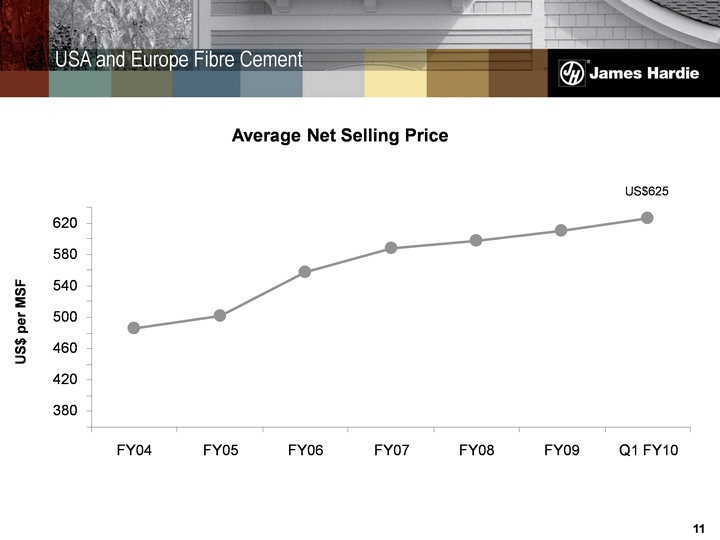
| 11 11 Average Net Selling Price US$ per MSF USA and Europe Fibre Cement 380 420 460 500 540 580 620 FY04 FY05 FY06 FY07 FY08 FY09 Q1 FY10 US$625 |
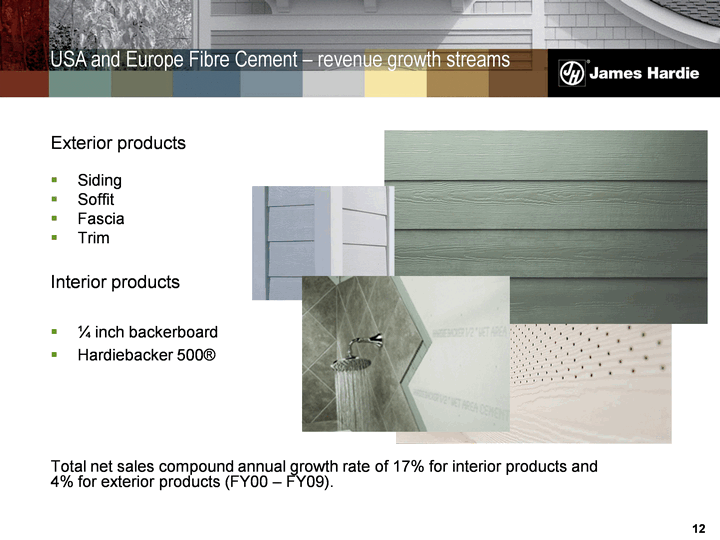
| 12 Exterior productsSidingSoffitFasciaTrimInterior products 1/4 inch backerboardHardiebacker 500(r) Total net sales compound annual growth rate of 17% for interior products and4% for exterior products (FY00 - FY09). USA and Europe Fibre Cement - revenue growth streams |
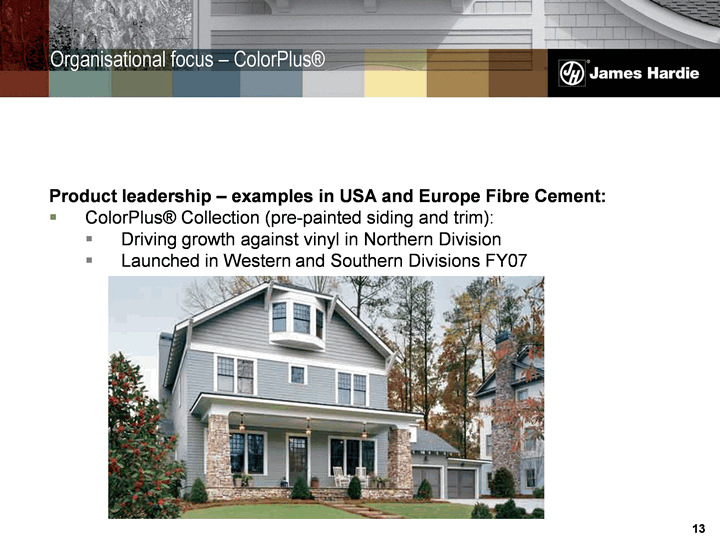
| 13 Product leadership - examples in USA and Europe Fibre Cement:ColorPlus(r) Collection (pre-painted siding and trim):Driving growth against vinyl in Northern DivisionLaunched in Western and Southern Divisions FY07 Organisational focus - ColorPlus(r) |
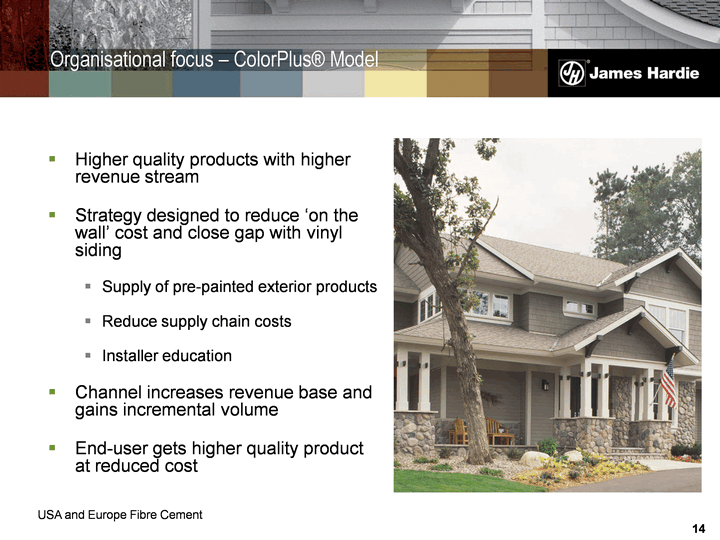
| 14 Higher quality products with higher revenue streamStrategy designed to reduce 'on the wall' cost and close gap with vinyl sidingSupply of pre-painted exterior productsReduce supply chain costsInstaller educationChannel increases revenue base and gains incremental volumeEnd-user gets higher quality product at reduced cost Organisational focus - ColorPlus(r) Model USA and Europe Fibre Cement |
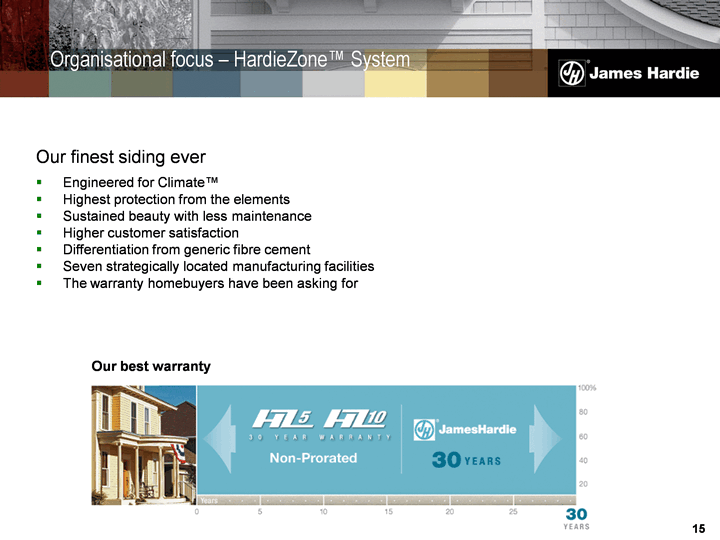
| 15 15 Our finest siding ever Engineered for Climate(tm)Highest protection from the elementsSustained beauty with less maintenanceHigher customer satisfactionDifferentiation from generic fibre cementSeven strategically located manufacturing facilitiesThe warranty homebuyers have been asking for Our best warranty Organisational focus - HardieZone(tm) System |
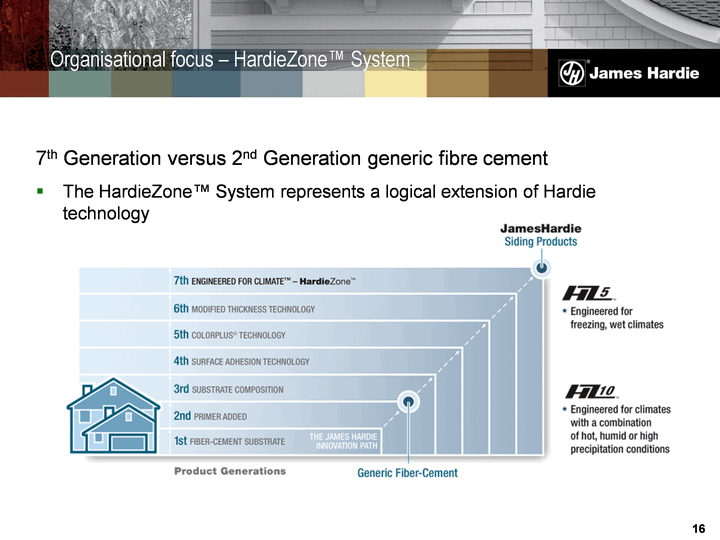
| 16 16 7th Generation versus 2nd Generation generic fibre cementThe HardieZone(tm) System represents a logical extension of Hardie technology Organisational focus - HardieZone(tm) System |
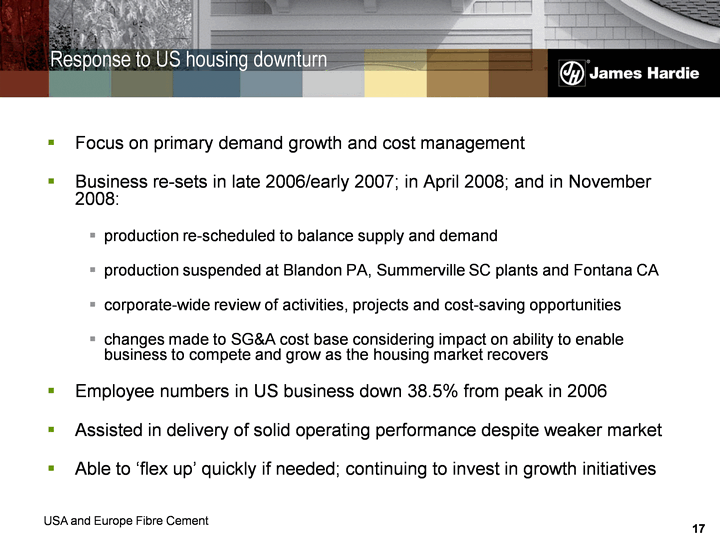
| 17 Focus on primary demand growth and cost managementBusiness re-sets in late 2006/early 2007; in April 2008; and in November 2008:production re-scheduled to balance supply and demand production suspended at Blandon PA, Summerville SC plants and Fontana CA corporate-wide review of activities, projects and cost-saving opportunitieschanges made to SG&A cost base considering impact on ability to enable business to compete and grow as the housing market recoversEmployee numbers in US business down 38.5% from peak in 2006Assisted in delivery of solid operating performance despite weaker market Able to 'flex up' quickly if needed; continuing to invest in growth initiatives USA and Europe Fibre Cement Response to US housing downturn |
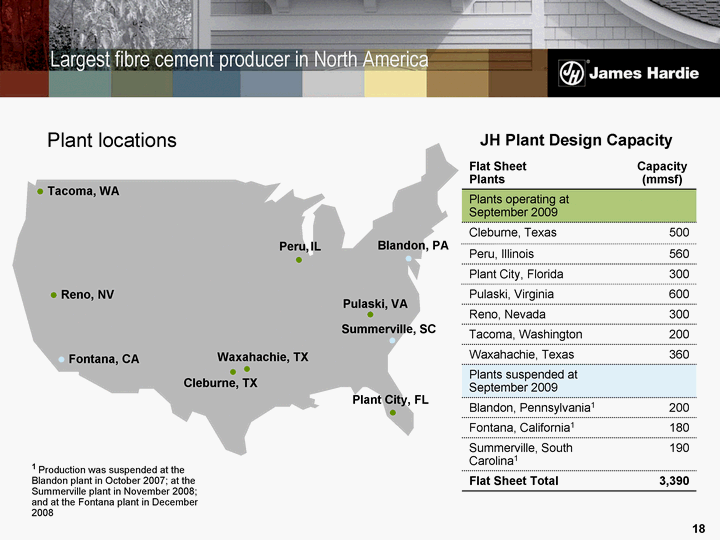
| 18 Flat Sheet Plants Capacity (mmsf) Plants operating at September 2009 Cleburne, Texas 500 Peru, Illinois 560 Plant City, Florida 300 Pulaski, Virginia 600 Reno, Nevada 300 Tacoma, Washington 200 Waxahachie, Texas 360 Plants suspended at September 2009 Blandon, Pennsylvania1 200 Fontana, California1 180 Summerville, South Carolina1 190 Flat Sheet Total 3,390 JH Plant Design Capacity Tacoma, WA Plant City, FL Waxahachie, TX Cleburne, TX Peru, IL Blandon, PA Summerville, SC Pulaski, VA Reno, NV Fontana, CA Plant locations 1 Production was suspended at the Blandon plant in October 2007; at the Summerville plant in November 2008; and at the Fontana plant in December 2008 Largest fibre cement producer in North America |
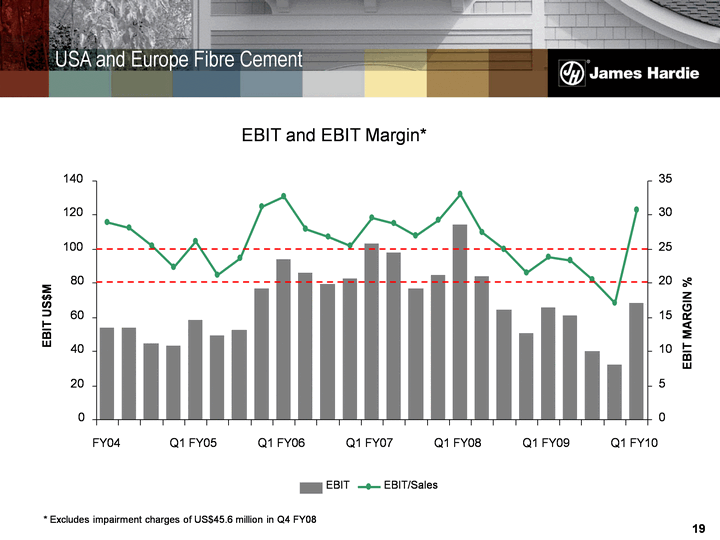
| 19 19 USA and Europe Fibre Cement 0 20 40 60 80 100 120 140 FY04 Q1 FY05 Q1 FY06 Q1 FY07 Q1 FY08 Q1 FY09 Q1 FY10 EBIT US$M 0 5 10 15 20 25 30 35 EBIT MARGIN % EBIT EBIT/Sales EBIT and EBIT Margin* * Excludes impairment charges of US$45.6 million in Q4 FY08 |
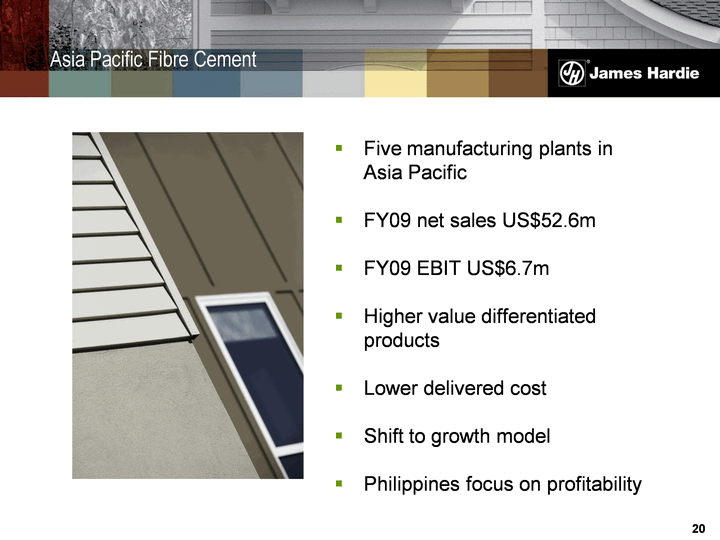
| 20 Five manufacturing plants in Asia Pacific FY09 net sales US$52.6m FY09 EBIT US$6.7mHigher value differentiated productsLower delivered costShift to growth modelPhilippines focus on profitability Asia Pacific Fibre Cement |
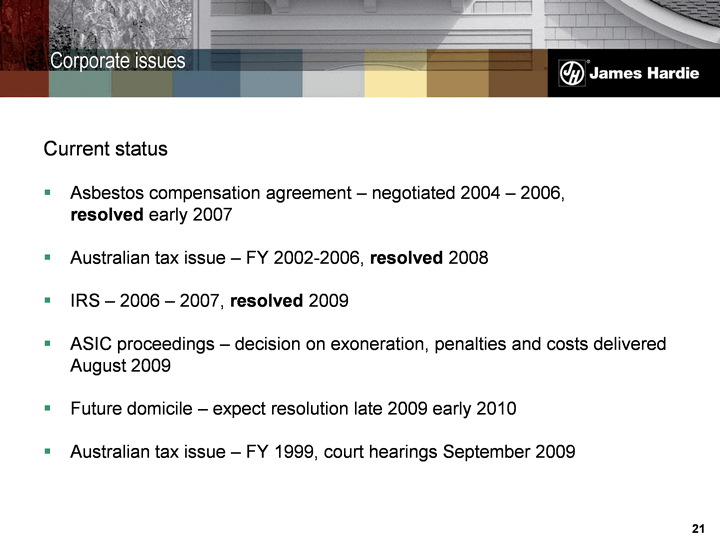
| 21 Current statusAsbestos compensation agreement - negotiated 2004 - 2006, resolved early 2007Australian tax issue - FY 2002-2006, resolved 2008IRS - 2006 - 2007, resolved 2009 ASIC proceedings - decision on exoneration, penalties and costs delivered August 2009Future domicile - expect resolution late 2009 early 2010Australian tax issue - FY 1999, court hearings September 2009 Corporate issues |
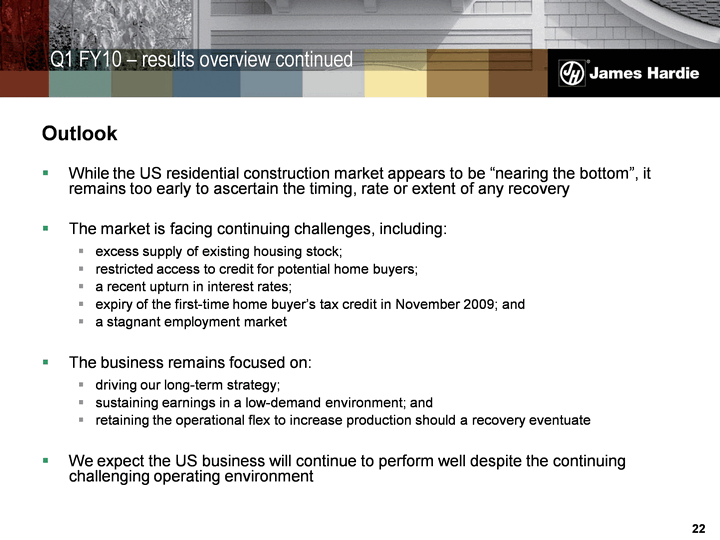
| 22 22 OutlookWhile the US residential construction market appears to be "nearing the bottom", it remains too early to ascertain the timing, rate or extent of any recoveryThe market is facing continuing challenges, including:excess supply of existing housing stock; restricted access to credit for potential home buyers;a recent upturn in interest rates; expiry of the first-time home buyer's tax credit in November 2009; and a stagnant employment marketThe business remains focused on:driving our long-term strategy; sustaining earnings in a low-demand environment; and retaining the operational flex to incre ase production should a recovery eventuateWe expect the US business will continue to perform well despite the continuing challenging operating environment Q1 FY10 - results overview continued |
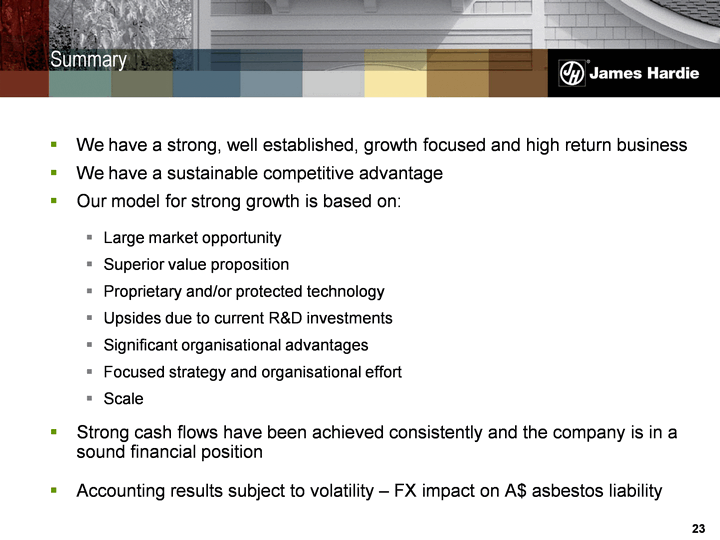
| 23 We have a strong, well established, growth focused and high return businessWe have a sustainable competitive advantageOur model for strong growth is based on:Large market opportunitySuperior value propositionProprietary and/or protected technologyUpsides due to current R&D investments Significant organisational advantagesFocused strategy and organisational effortScaleStrong cash flows have been achieved consistently and the company is in a sound financial position Accounting results subject to volatility - FX impact on A$ asbestos liability Summary |
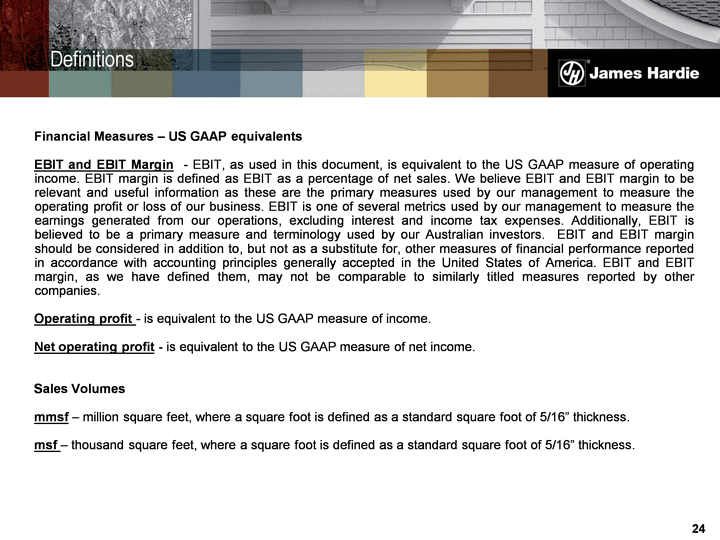
| 24 24 Financial Measures - US GAAP equivalentsEBIT and EBIT Margin - EBIT, as used in this document, is equivalent to the US GAAP measure of operating income. EBIT margin is defined as EBIT as a percentage of net sales. We believe EBIT and EBIT margin to be relevant and useful information as these are the primary measures used by our management to measure the operating profit or loss of our business. EBIT is one of several metrics used by our management to measure the earnings generated from our operations, excluding interest and income tax expenses. Additionally, EBIT is believed to be a primary measure and terminology used by our Australian investors. EBIT and EBIT margin should be considered in addition to, but not as a substitute for, other measures of financial performance reported in accordance with accounting principles generally accepted in the United States of America. EBIT and EBIT margin, as we have defined them, may not be comparable to similarly titled measures reported by other companies.Operating profit - is equivalent to the US GAAP measure of income.Net operating profit - is equivalent to the US GAAP measure of net income.Sales Volumesmmsf - million square feet, where a square foot is defined as a standard square foot of 5/16" thickness.msf - thousand square feet, where a square foot is defined as a standard square foot of 5/16" thickness. Definitions |